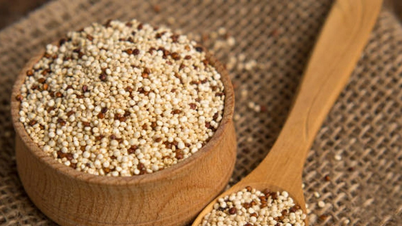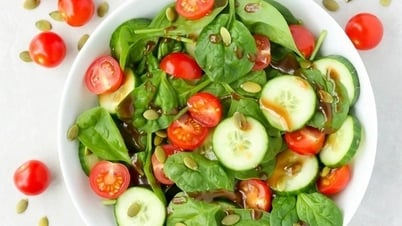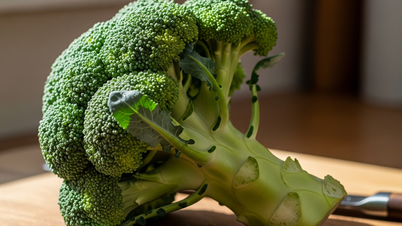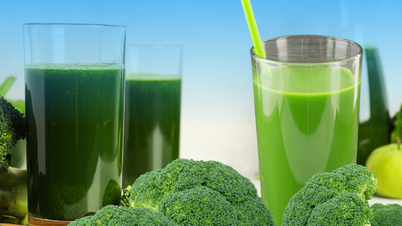Broccoli is a member of the cruciferous vegetable family and is one of the most popular vegetables in the world due to its high nutritional value.
Not only is broccoli a familiar ingredient in everyday dishes, it is also praised by health experts as a "superfood" that helps prevent disease and improve overall health. With low calories but rich in fiber and vitamins, this vegetable is suitable for all ages, from children to the elderly.

Broccoli is low in calories and rich in fiber and vitamins (Photo: Unsplash).
What's in the "superfood" broccoli?
Broccoli is a treasure trove of essential nutrients. A 100g serving contains around 35 calories and over 5g of both soluble and insoluble fiber, which helps keep you full and aids digestion.
In terms of vitamins, broccoli excels with vitamin C (over 100% of the daily requirement), which supports the immune system by boosting white blood cell production and is an antioxidant, helping the body fight infections and premature aging.
Rich in vitamin K (about 100mcg) which plays an important role in blood clotting and bone health, working with calcium and magnesium to prevent osteoporosis, especially in postmenopausal women.
In addition, beta-carotene in broccoli also helps protect the eyes and skin. While B vitamins such as folate (B9), riboflavin (B2), pyridoxine (B6) and thiamin (B1)... support energy production, cell repair and tissue growth.
In terms of minerals, broccoli provides potassium to help regulate blood pressure and cardiovascular function, iron to support red blood cell production, prevent anemia, and calcium to help strengthen bones.
In particular, cruciferous vegetables like broccoli contain sulforaphane - a powerful antioxidant compound from glucoraphanin activated by the enzyme myrosinase.
Sulforaphane helps eliminate toxins, inhibit the growth of cancer cells, reduce inflammation and protect the liver from damage. Studies show that regular consumption of foods containing sulforaphane can reduce the risk of breast, colon and lung cancer by fighting free radicals.
Additionally, the fiber in broccoli controls bad cholesterol (LDL), stabilizes blood sugar, reduces the risk of type 2 diabetes, and supports heart health by preventing atherosclerosis.
How to cook broccoli to retain maximum nutrients
According to Associate Professor Stephani Johnson, Department of Nutrition, Rutgers Medical School, to make the most of the nutrients, especially heat-sensitive sulforaphane in broccoli, people should only cook this food at medium temperature (about 100-120 degrees Celsius) for a short time, only 3-5 minutes.

Broccoli should only be cooked at medium heat for a short time to avoid losing nutrients (Photo: Unsplash).
Additionally, a key tip when preparing broccoli is to cut it into small pieces and let it rest for about 90 minutes before cooking. This activates the enzyme myrosinase, which converts glucoraphanin to sulforaphane more efficiently, even if heat later inactivates the enzyme.
Besides, steaming quickly (2-3 minutes) or eating broccoli raw is also a method recommended by many scientists to retain vitamin C and fiber.
People should also avoid boiling or deep-frying broccoli for long periods of time, as boiling water destroys up to 90% of sulforaphane and water-soluble vitamin C, leading to nutrient waste.
With these benefits, nutritionists encourage people to eat broccoli every day. A serving of broccoli about 150-300g per day provides essential nutrients without exceeding calories, supporting immunity, bones and joints, cardiovascular health and preventing cancer.
According to Health Shots , eating too much broccoli (more than 2 cups a day) can lead to digestive upsets like bloating or diarrhea due to its high fiber content. Additionally, overconsumption can cause nutritional imbalances if not combined with other foods.
Broccoli also contains goitrogens, natural compounds that can interfere with the absorption of iodine, which is needed to produce thyroid hormones.
This compound, when consumed in large amounts in its raw form, can impair thyroid function. This can lead to an enlarged thyroid gland (goiter) or aggravate hypothyroidism. Therefore, people with thyroid problems should limit their intake of raw broccoli and prefer cooked broccoli (steamed or lightly stir-fried) to neutralize the goitrogen.
Broccoli is high in vitamin K. About 91g of broccoli can provide about 116% of the daily requirement for women and 83% for men.
Vitamin K plays an important role in blood clotting, but it can also interact with anticoagulant drugs such as warfarin. Therefore, people taking warfarin need to maintain a stable vitamin K intake, limit broccoli to 1-2 cups/day, and consult a doctor before changing their diet.
Source: https://dantri.com.vn/suc-khoe/sai-lam-khi-che-bien-sieu-thuc-pham-khien-mon-an-mat-chat-20250909144926698.htm


![[Photo] Super harvest moon shines brightly on Mid-Autumn Festival night around the world](https://vphoto.vietnam.vn/thumb/1200x675/vietnam/resource/IMAGE/2025/10/07/1759816565798_1759814567021-jpg.webp)


































































































Comment (0)